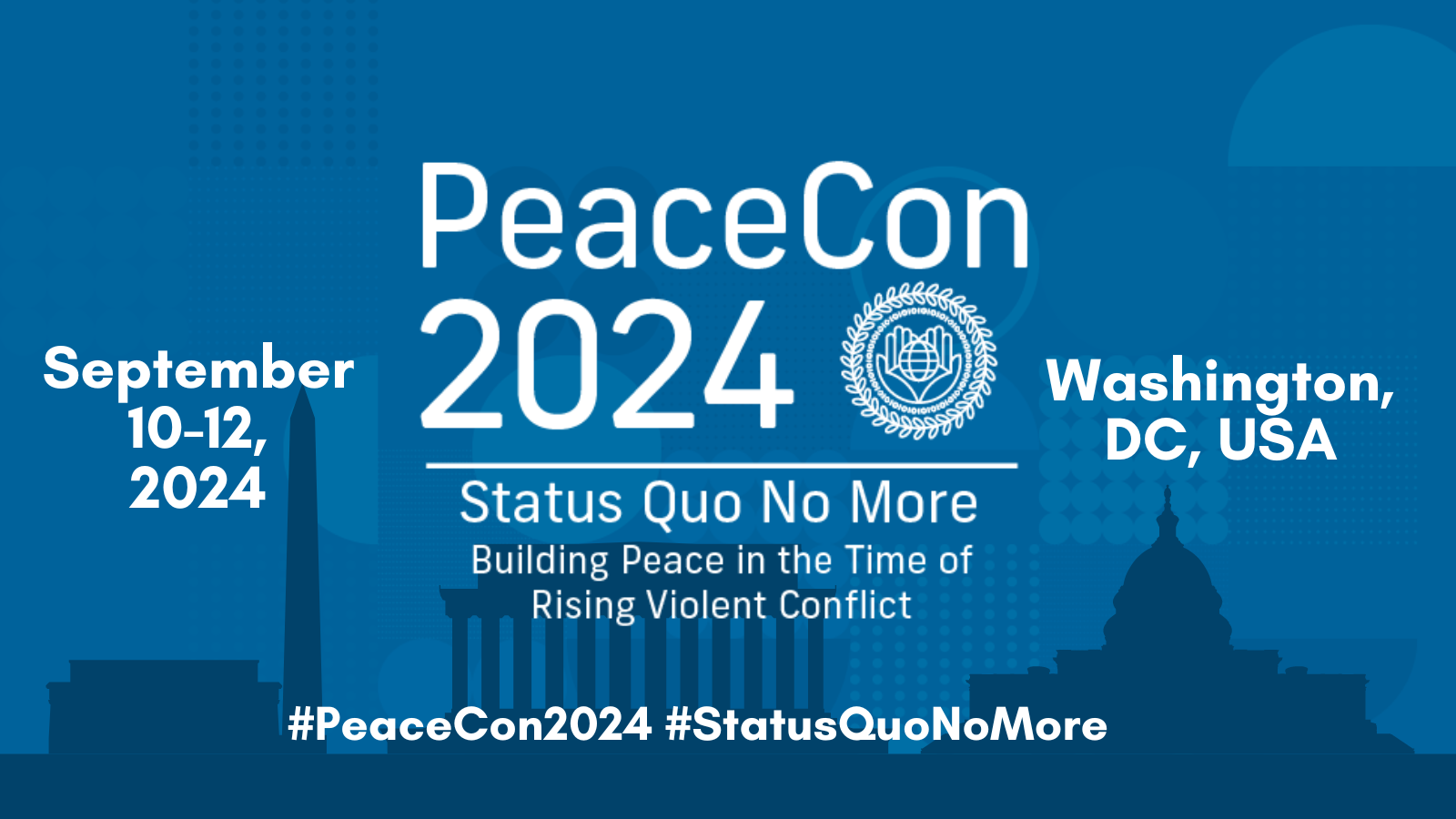PeaceCon 2024—
STATUS QUO NO MORE:
bUILDING pEACE IN THE TIME OF RISING VIOLENT CONFLICT
On September 10th - 12th, AfP and the U.S. Institute of Peace (USIP) held the 12th annual PeaceCon, the premier global gathering designed to address contemporary challenges in peacebuilding and conflict resolution. Taking place in hybrid format, the conference focused on the theme “Status Quo No More: Building Peace in a Time of Rising Violent Conflict,” bringing together senior officials, thought leaders, policymakers and practitioners from around the globe to explore and tackle the challenges facing the peacebuilding community.
Amid a global rise in fragility and violence, including a deepening war in Ukraine and crisis in the Middle East, the peacebuilding community is navigating a dramatically evolving conflict landscape. New trends like artificial intelligence and environmental disruptions could cause large-scale shocks and violence. Meanwhile, a general decline in social cohesion and trust is complicating the resolution of violent conflicts. The rise of a wide array of new actors—both state and nonstate—is bringing forth a multipolar world, and new global fault lines are emerging. Despite these new challenges and shifts, the peacebuilding community has an opportunity to leverage scalable, evidence-based and locally-led solutions to prevent and reduce conflict drivers while helping to build more sustainable peace and resiliency.
Charting a way forward for the peacebuilding community will require reframing peacebuilding in ways that are actionable, practical and results-oriented. It will require more effectively and urgently building champions among communities of policymakers, business leaders, bilateral and multilateral donors, the nonprofit sector, and the broader public.
PeaceCon 2024 Themes:
Anticipating Shocks and Disruptions and Leveraging Innovations and Evidence-Based Solutions:
Many large-scale shocks and disruptions are fundamentally changing how societies function and increasing threats of violent conflict and extremism—from artificial intelligence to climate change, shifting demographics and migrant patterns, and more. Sessions should address how the peacebuilding field can advance evidence-based norms, policies, and programs that ensure these disruptors and shocks can be anticipated and managed and how innovations and evidence-based solutions can build sustainable peace.
Integrating and Aligning Peacebuilding and Conflict Prevention
For too long, peacebuilding and conflict prevention have remained deprioritized and siloed in policies, programming, and funding mechanisms, leading to missed opportunities to address drivers of conflict and crisis and build sustainable peace. The peacebuilding sector must champion and develop coordinated policy responses and programming that advance integrated approaches. Sessions will explore the impacts of integrated and multisectoral policy and programmatic approaches, learning, best practices, and standards that can be scaled to ensure we address the correct drivers of conflict. They will also explore solutions to overcoming siloed approaches to development assistance, diplomacy, security cooperation, and other sectors, including health, technology, brain science, and beyond.
Rebuilding Social Cohesion and Trust
Peacebuilders refer to social cohesion as “the glue that holds societies together.” Societies with high levels of social cohesion (trust in institutions and promoting strong social relations and capital show greater resilience to shocks and conflict, while lower social cohesion can lead to violent conflict and instability. Today, social cohesion and trust are rapidly declining globally. Sessions will focus on what is and is not working systemically to promote social cohesion at the vertical level (between citizens and governments) and at the horizontal level (between communities) and why it is vital to building peace.
Reframing Peacebuilding Narratives
The peacebuilding field needs to be more effective in its collective messaging because it continues to struggle to communicate what peacebuilding is, why it matters, and how it can advance the field. Sessions will address how we can effectively reframe how peacebuilders and the media communicate to build robust champions with policymakers, lawmakers, and the public. Proposals under this theme should explore reframing narratives and storytelling in peacebuilding and how to best disseminate them.
Peacebuilding in a Multipolar World
In a multipolar world, the peacebuilding community now must grapple with a growing and increasingly diverse set of peacebuilders. A diffusion of power has empowered non-traditional actors, including emerging “Middle Powers”, regional organizations, and non-state groups, to enter the peacebuilding space. New alignments are reshaping the landscape of conflict mediation beyond the traditional parties at the negotiating table and must be taken into account. Facing new actors and disruptors, the peacebuilding community must refit and update the traditional peacebuilding toolkit to effectively address conflict around the world.
MEET OUR HIGH-LEVEL SPEAKERS














